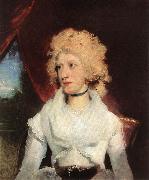Wholesale Oil Painting No Minimum |
|||||||||||
|
|
|||||||||||

|
|||||||||||
|
|
|
||||||||
LAWRENCE, Sir ThomasEnglish painter (b. 1769, Bristol, d. 1830, London). Thomas Lawrence was born in Bristol on May 4, 1769. At Devizes, where his father was landlord of the Black Bear Inn, Thomas's talents first became known. Fanny Burney, a prodigy herself, reports that in 1780 Sir Joshua Reynolds had already pronounced Lawrence the most promising genius he had ever met. When Thomas was 10, his father moved the family to Oxford and then to Bath to take advantage of the portrait skill of his son. At the age of 17 Lawrence began to paint in oil, all his previous work having been in pastel. In 1787 the family moved to London, and by 1789 he was challenging Reynolds. When Reynolds died in 1792, Lawrence was appointed to the lucrative post of painter in ordinary to the king. He soon became the foremost portrait painter in England, a position he maintained until his death. His portraits of women are models of beauty and elegance, whether the sitter be a tragic actress like Mrs. Siddons, a social figure like the Princess de Lieven, or a personal friend. At the close of the Napoleonic Wars, Lawrence was knighted and commissioned to paint the leading sovereigns and statesmen of Europe. When he returned to England in 1820, he was elected president of the Royal Academy; he handled the affairs of his office with tact and urbanity. He died on Jan. 7, 1830. Following the English masters of the 18th century, Reynolds, Thomas Gainsborough, and George Romney, Lawrence carried on the great tradition of society portraiture and raised it to new heights of dash and elegance, though not of psychological penetration. He was by no means an artist of the astonishing insight of Gainsborough, and he did not have the occasionally disconcerting originality of Reynolds. Lawrence had their faults: all were affected by the distorting demands of their fashionable clientele, and all succumbed to them. He had the least to say, and he reflected his sitters' own best views of themselves, yet even they must sometimes have been surprised at their own magnificence. Handsome his portraits undoubtedly are; all the women are strikingly beautiful, the men brave and distinguished. Lawrence enjoyed his great success. He lived for his work, never married, and was a prodigious worker. He was of an exceptionally generous nature, as an artist and as a man, with a rare talent for appreciating and encouraging the talents of others. He was an ardent collector of Old Master drawings; his collection, which was dispersed after his death, |
||||||||
|
|
||||||||
Miss Martha Carry dh
Miss Martha Carry dh Painting ID:: 7820 |
c. 1789
Oil on canvas, 76 x 64 cm
Museo del Prado, Madrid c. 1789 Oil on canvas, 76 x 64 cm Museo del Prado, Madrid |
|||||||
|
CONTACT US |

